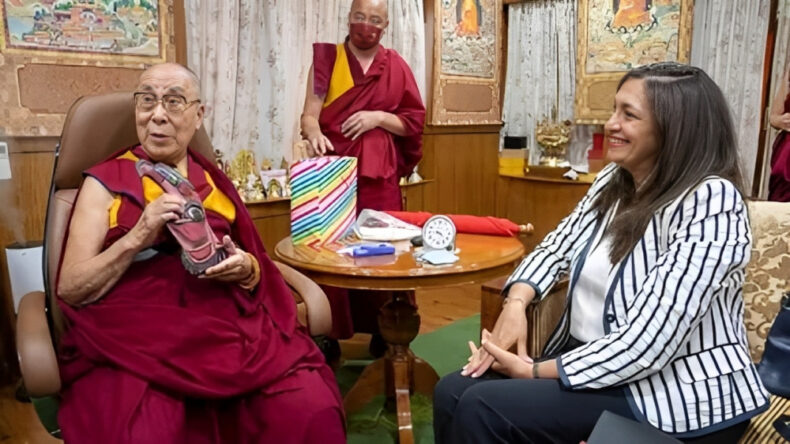Amidst escalating tensions between the United States and China, a meeting between Uzra Zeya, the US undersecretary for civilian security, democracy, and human rights, and the Dalai Lama in New Delhi has sparked a strong response from Beijing. China has vehemently opposed any external interference in Tibet, labelling it as China’s internal affair. This article examines the repercussions of the meeting and the ongoing power struggle between the two nations.
China’s Objection to the Meeting:
The Chinese embassy in India issued a strongly worded statement opposing any contact between foreign officials and “Tibetan independence” forces. China firmly asserts that Tibet is a purely internal affair and that no external forces have the right to interfere. They consider Uzra Zeya’s position and the meeting with the Dalai Lama as an offence and political manipulation to interfere in China’s internal affairs.
Chinese Accusations and Perspective:
China contends that the Dalai Lama is not solely a religious figure but rather a political exile engaged in anti-China separatist activities. They dismiss the Tibetan government in exile as a criminal organization that violates China’s Constitution and laws. China firmly opposes any form of contact between foreign officials and what they refer to as the “Tibetan independence” forces.
Historical Context:
China’s opposition to international diplomatic parleys with the Dalai Lama is rooted in its historical view that Tibet is an integral part of its territory. Since the annexation of Tibet in 1950, China has maintained a strict stance against any foreign involvement in Tibetan affairs.
US Objectives and Response:
Uzra Zeya’s visit to India and meeting with the Dalai Lama align with the broader goals of her trip, which include discussing the deepening US-India partnership, global challenges, democracy, regional stability, and humanitarian relief. The US State Department emphasises the enduring partnership between the US and India to create a more open, prosperous, secure, inclusive, and resilient world.
Reactions and Statements:
The Chinese embassy’s spokesperson urges the US to refrain from meddling in China’s internal affairs under the pretext of Tibet-related issues. They call for the US to honour its commitment to acknowledging Tibet as part of China and to offer no support to what they refer to as the “anti-China separatist activities of the Dalai clique.”
Ongoing Power Struggle:
The strong response from China reflects the ongoing power struggle between the US and China. China firmly asserts its sovereignty over Tibet and resists any foreign involvement or support for the Dalai Lama and the Tibetan government in exile. The US, on the other hand, remains committed to supporting Tibetan issues and promoting human rights and democracy.
The meeting between Uzra Zeya, a US official, and the Dalai Lama in India has heightened tensions between the United States and China. China strongly opposes any external interference in Tibet and considers the Dalai Lama and the Tibetan government in exile as engaging in separatist activities.
The United States, driven by its commitment to human rights and democracy, supports Tibetan issues and engages with the exiled spiritual leader. However, China perceives these actions as meddling in its internal affairs and demands that the US acknowledge Tibet as part of China. This exacerbates the existing strained relationship between the two nations.
The power struggle between the US and China extends beyond Tibet, encompassing broader geopolitical and economic issues. The implications of this meeting are not limited to US-China relations but also affect other countries with ties to both nations, as they must navigate the delicate balance between human rights and economic considerations.
As tensions rise, diplomatic finesse and peaceful dialogue are crucial to prevent further escalation. Constructive engagement and open communication can foster understanding and contribute to a more stable international landscape.













